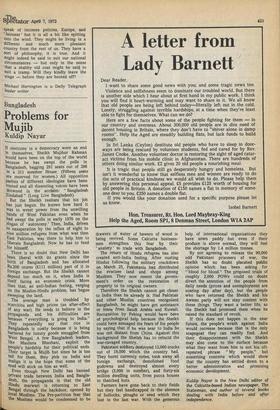Bangladesh
Problems for Mujib
Kuldip Nayar
If elections in a democracy were an end In themselves, Sheikh Mujibur Rahman would have been on the top of the world because he has swept the polls in Bangladesh, bagging 291 seats out of 296 In a 311 member House. (Fifteen seats are reserved for women.) All opposition Parties of different ideologies have been routed and all dissenting voices have been drowned in the acclaim: "Bangladesh Zindabad " (Long Live Bangladesh).
But the Sheikh realises that his job has just begun. He knows how hard it Was to wrest power from the unwilling hands of West Pakistan even when he had swept the polls in early 1970 on the Slogan of ' autonomy.' Then, India, driven to exasperation by the influx of eight to nine million refugees from what was then East Pakistan, was there to help him to liberate Bangladesh. Now he has to fend for himself.
There is no doubt that New Delhi has been liberal with its grants since the birth of Bangladesh and has allocated Rs.200 crores (£111 million) part of it in foreign exchange. But the Sheikh cannot depend too much on it, when India is itself facing an economic crisis. More than that, an anti-Indian feeling, verging on the Muslim-Hindu problem, has begun sweeping the land. The average man is troubled by scarcities and high prices (an after-effect of any war). He tends to believe in the Propaganda and his difficulties are because "everything is going to India." They repeatedly say that rice in Bangladesh is costly because it is being bartered for luxury goods smuggled from West Bengal. A few Bangladesh leaders, like Maulana Bhashani, exploit the People's hardship for their political ends. Their target is Mujib but since he is too tall for them, they pick on India and malign it in the hope that some of the mud will stick on him as well.
Even though New Delhi has banned private trade between India and, Bangladesh, the propaganda is that the old Hindu marwari is returning to East Bengal through the backdoor, opened by local Muslims. The Pre-partition fear that the Muslims would be condemned to be drawers of water of hewers of wood is being revived. Some Calcutta businessmen strengthen this fear by their ' anxiety ' to trade with Bangladesh.
The return of Hindu refugees has also created anti-India feeling. After ousting Hindus following the military crackdown on March 25, Pakistanis had distributed the evacuee land and shops among Muslims. They now resent the government's order on the restoration of property to its original owners.
Therefore the Sheikh cannot get closer to India than he already is. Had Pakistan and other Muslim countries recognised Bangladesh, he might have got assistance or loans from Saudi Arabia and Kuwait.
Recognition by Peking would have been of psychological help because the Sheikh could have assuaged the fears of his people by saying that if he was near to India he was not distant from China. Against this background the Sheikh has to rebuild the war-ravaged country.
Pakistani soldiers destroyed 12,000 trucks out of 18,000 which the country had.
They burnt currency notes, took away all foreign exchange, demolished food godowns and destroyed almost every bridge (3,000 in number), and forty-six million dwelling units, from pucca houses to thatched, huts.
Farmers have gone back to their fields but they feel handicapped in the absence of bullocks, ploughs or seed which they lost in the last war. With the generous help of international organisations they have sown paddy but even if their produce is above normal, they will feel the shortage by 1.4 million tonnes.
By not agreeing to release the 90,000 odd Pakistani prisoners of war, the Sheikh has no doubt placated public opinion which has been asking for "blood for blood." The proposed trials of roughly 2,000 POWs could no doubt divert the attention of the people from daily needs (prices and unemployment are soaring day after day), but the people who have returned the Sheikh and his Awami party will not stay content with these things. They want a better life, as the Sheikh had promised them when he raised the standard of revolt.
If this does not happen in the near future, the people's wrath against India would increase because that is the only scapegoat they can readily find. And their disappointment with the Sheikh may also come to the surface because what they want from him is not his oftrepeated phrase "My people," but something concrete which would show that the country has settled down to a better administration and promising economic development.
Kuldip Nayar is the New Delhi editor of the Calcutta-based Indian newspaper, The Statesman, and author of several books dealing with India before and after independence.


































 Previous page
Previous page